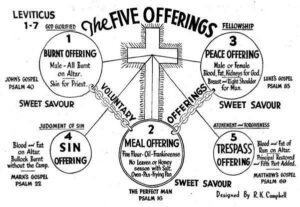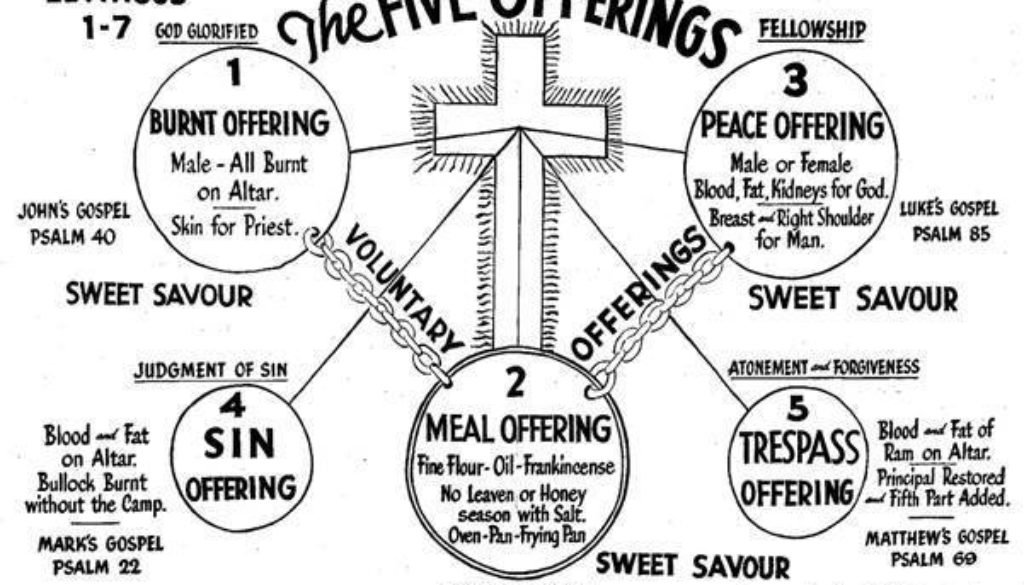Leviticus 6:8-7:38 The Priests’ Portions

God finishes His instructions on the offerings He has ordained. He addresses the priests’ portions of each of these offerings.
The priests were given a portion of every offering brought before God EXCEPT those offered for themselves or the whole congregation. We have already seen that those bringing the offering are expected to do a major part of the work for their sacrifice but the priests are the ones who actually get to offer it to God. They are the intermediary between the people and the Lord and therefor are granted a portion of the offering for their service. This is also because when the territory is divided up later on, the Levites receive none of it. They are supported by their “brothers” bringing offerings. These are their portions.
When we were looking at the other offerings we made a jump into today’s reading to find what the priest’s portion was. We saw that in the sin offering everything left after God’s portion went to the priest. In the peace offering we noted that the breast and right thigh were the priest’s portions. And we saw that in the grain offerings the priest received the balance of the offering after giving a handful of it to the Lord as His “memorial portion.” What we didn’t look at though was what the priests did with their portions and the people did with theirs.
This is just me thinking through my fingers but HOW did the priests eat all that was brought to them each day! I’m assuming there were sacrifices going on all day and probably several each day. The peace offering that was brought as a thanks giving reason, ALL of the meat had to be eaten that day. The person bringing the offering, who arguably had a larger portion to eat, could have help in consuming his portion. But even that meat could only be eaten by those who were “clean” by God’s standard. The priest however had to consume his portion, right thigh and breast, IN the courtyard THAT DAY. If that priest had several people who he helped with their sacrifices that day how could he possibly ingest all his portions?
The peace offering that was brought to seal a vow could be eaten over two days. But we run into trouble again if many offerings were brought during both days. I wonder how much meat went onto the burn pile because there were not enough mouths or large enough stomachs to consume it all.
Not eating the sacrifice in the appropriate amount of time or while being “unclean” had a disastrous result. The person who is unclean and eats of the offering is to be “cut off from his people.” In other words, this is a serious sin and incurs a serious punishment.
I was wondering about this “cutting off” phrase so went looking for answers, through Google of course. I found a few sites that spoke of “Keret” which is the Jewish word for this state. It can be a physical death (cut off from life), a cessation of one’s family line (name cut off from a future), permanent spiritual separation from God (cut off from the afterlife), exiled from your people (cut off in relationship), or a combination of two or more aspects.
I also wanted to know if someone who was “cut off” could be restored. That same site brought up a very good precedent set by God in 2 Chronicles 30:17-20. The people had eaten the Passover while unclean and were cut off for their sin but Hezekiah interceded on their behalf and God forgave those who were truly seeking Him. I’m assuming that this means that they were restored.
Something else interesting about the peace offering brought as a seal for a vow is that if the meat is eaten on the third day that the vow is useless. I was thinking about this and realized that it wasn’t because someone somewhere ate the meat out of turn but because the one making the vow had not exercised diligence with his own sacrifice. HE was in charge of watching over the meat and destroying what was left on the morning of the third day. If he was so lax in watching over his offering, how could he be trusted to watch over whatever it was he had promised to the Lord? His commitment was in serious doubt.
I’m also curious about the priests’ families. The meat from these sacrifices were to be eaten in the tabernacle courtyard. Did the family get to partake in the meals? Did the women get any meat? If the family did eat too, did they have to do so inside the courtyard? Where was the priest’s portions cooked? Who did the cooking?
I know. I’m going off on a tangent but I’m curious about these issues. I wonder what daily life inside the courtyard looked like. There was certainly a LOT of activity going on there, including all the clothes changes for the chores that took place both inside and outside the tabernacle enclosure. I’m CERTAIN they didn’t use the Tabernacle itself as a changing room! So where did they change?
Father God, I’m not trying to make light of Your house. Nor am I meaning any disrespect. I’m curious though what it looked like each day. I know the fire was always burning, sacrifices were being offered morning and evening, people coming and going with their own sacrifices, animals being brought in and carried out, and probably a hundred other things You didn’t describe for us. I wish I could see it firsthand. I would settle for a Spirit inspired dream. The thought of the sights and sounds that surrounded Your house brings to mind the joy I feel when my children and grandchildren are visiting my home. I love watching out the window and watching the grandkids play together. Seeing my children talking together over their experiences as parents or reminiscing over their youth fills me with pride. Sharing activities I created with them and watching their reactions can be both exciting and frustrating. Are these some of the things You experienced when Your children gathered at Your home? Family time.
Your gatherings were a lot more respectful and regulated though. But You still made a place for fellowship among the required elements. Did the priests share in the stories of those who were bringing their offerings? Did they encourage one another? “I know you are having a hard time right now. I will say an extra prayer for your family tonight.” Brother holding brother and bringing their needs to their Father.
Forgive me Father if I’m bringing too much “familiarity” into my picture of Your Tabernacle. It is probably because I have that personal relationship with You that they wanted. I’m not limited to only accessing You when I bring one of the prescribed sacrifices. I can come to You any time with my needs, concerns, and praise. THANK YOU FATHER for that welcome! Thank You that there is no separation any longer. Thank You also for the vision of the “family gathering around.” It touches my heart for Your people and gives me something more from this book that You know I’m struggling with.



